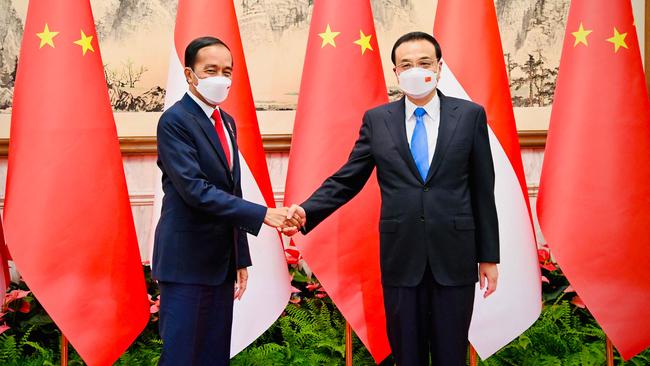Joko Widodo breaks bread with Xi Jinping in Beijing
The Chinese and Indonesian leaders have agreed to strengthen communication between their countries’ maritime agencies.

Chinese President Xi Jinping and Indonesia’s Joko Widodo have agreed to strengthen communication between their countries’ respective maritime agencies and accelerate a new five-year action plan under their comprehensive strategic partnership following a rare meeting between the two leaders in Beijing on Tuesday.
Indonesian students will also return to China after more than two years of lockdowns, and there will be more flights between the two countries as China signalled its willingness to expand economic, development and tourism ties with Jakarta.
The in-country talks between the two presidents is the first China has hosted with a foreign leader since the February Winter Olympics, when Mr Xi and Russian President Vladimir Putin declared a “no limits” friendship just a few weeks before Moscow invaded Ukraine.
“His excellency is the first Head of State the Chinese side has received after the Beijing Winter Olympics. This is enough to prove how intimate the relationship between the two sides is,” Mr Xi said in remarks ahead of his meeting with the Indonesian President, who will also visit Japan and South Korea this week.
Jokowi also met with Li Keqiang on Tuesday during which the Chinese Premier committed to import an additional one million tonnes of crude palm oil from Indonesia, the Indonesian state palace said. Both meetings were held at the Diaoyutai State Guesthouse, part of a complex of villas, lakes and gardens where foreign leaders, including Richard Nixon, have been received.
Jokowi – who indicated ahead of his visit that he hoped to improve trade ties with Beijing – told Mr Xi during their meeting: “China is Indonesia’s comprehensive strategic partner. We must fill this partnership with cooperation that is beneficial for our country, and at the same time for the region and the world.”
The two leaders also agreed to expand co-operation in development financing; strengthen co-operation in agriculture, health, poverty alleviation and food security; and cultivate green development and the digital economy.
Ahead of the talks, Chinese state mouthpiece the Global Times said Beijing had “always appreciated Indonesia’s determination to stand up against hegemony and to stick to a non-alignment approach”.
“Indonesia’s stance and devoted efforts in promoting fair global development will not only win China’s support in the upcoming G20 summit, but will also help the country, as well as the whole ASEAN, to choose what is best for them, excluding the US-made cacophony of a so-called China threat,” it added.
Yet the two leaders’ agreement to improve maritime communications suggests China’s claims to fishing rights in Indonesia’s north Natuna waters, part of the disputed South China Sea which it also claims largely as its own, was raised during the talks.
The issue is a source of tension between the two Asian giants and the motivation for Jokowi’s push to develop the Natuna islands, one of its most isolated and resource-rich regions, and build up its military presence there.
China is in open dispute with Vietnam, Malaysia, The Philippines, Taiwan and Brunei over its occupation and militarisation of a number of islands and shoals within the South China Sea.
It has refused to recognise a landmark 2016 judgment by the Permanent Court of Arbitration at The Hague that found no evidence that China had exercised exclusive control historically over the key waterway.
Indonesia is one of China’s biggest trading partners and an important source of nickel, coal, copper and natural gas for the world’s second-largest economy. In the first half of 2022, Chinese imports from Indonesia, mostly commodities, surged 34.2 per cent, the most after Russia.
Indonesian Foreign Minister Retno Marsudi said the two leaders also discussed world issues and Mr Xi appreciated Jokowi’s efforts at mediating a peace between Russia and Ukraine and improving the humanitarian situation, including through his visits to Kyiv and Moscow.
“This visit is considered by President Xi (an effort) to show Indonesia’s responsibility as a big country,” Ms Retno said.
“As the largest economy in Southeast Asia, Indonesia has an important place for China and the region, especially now that Indonesia holds the G20 presidency and next year will be the chair of ASEAN.”




To join the conversation, please log in. Don't have an account? Register
Join the conversation, you are commenting as Logout